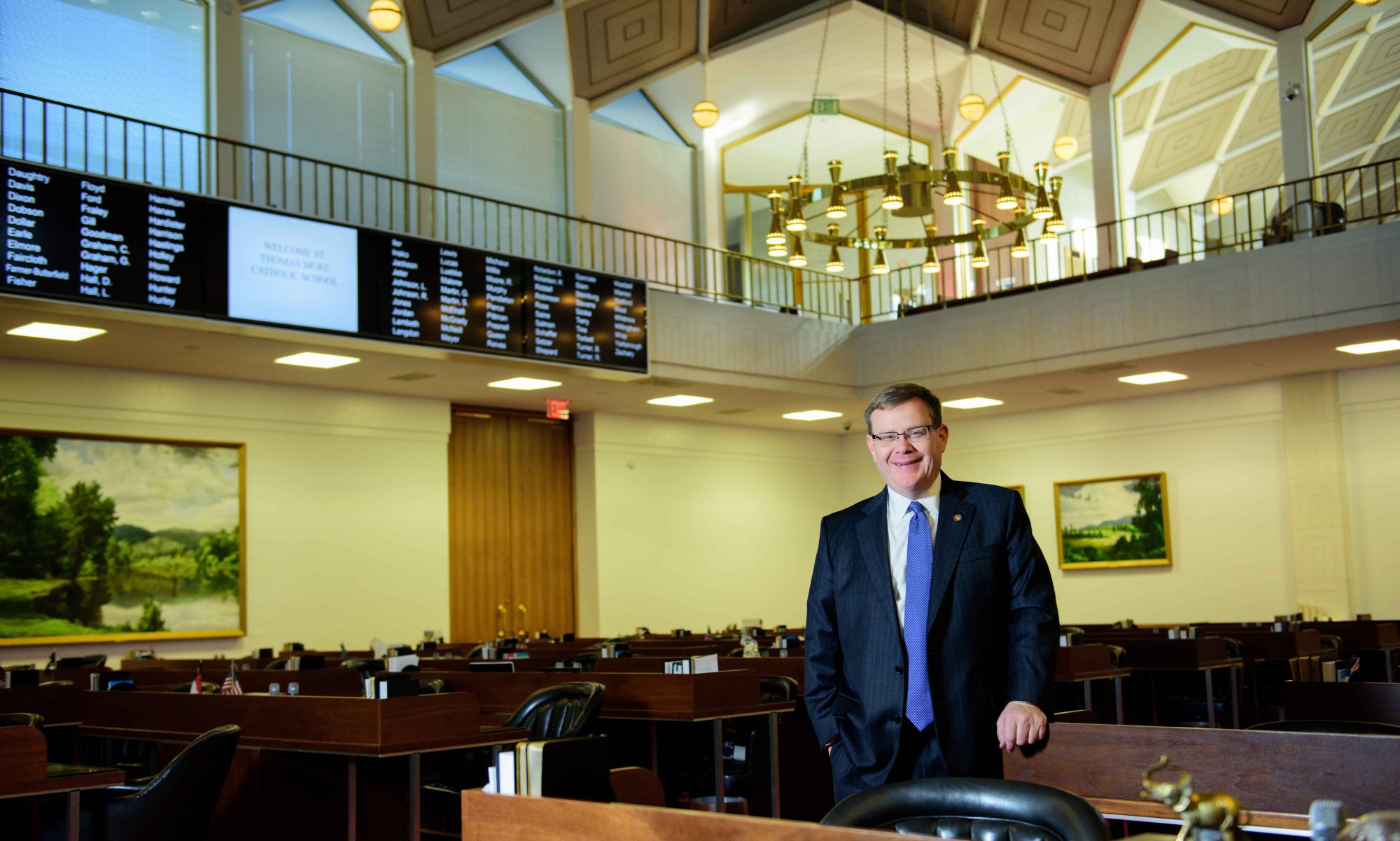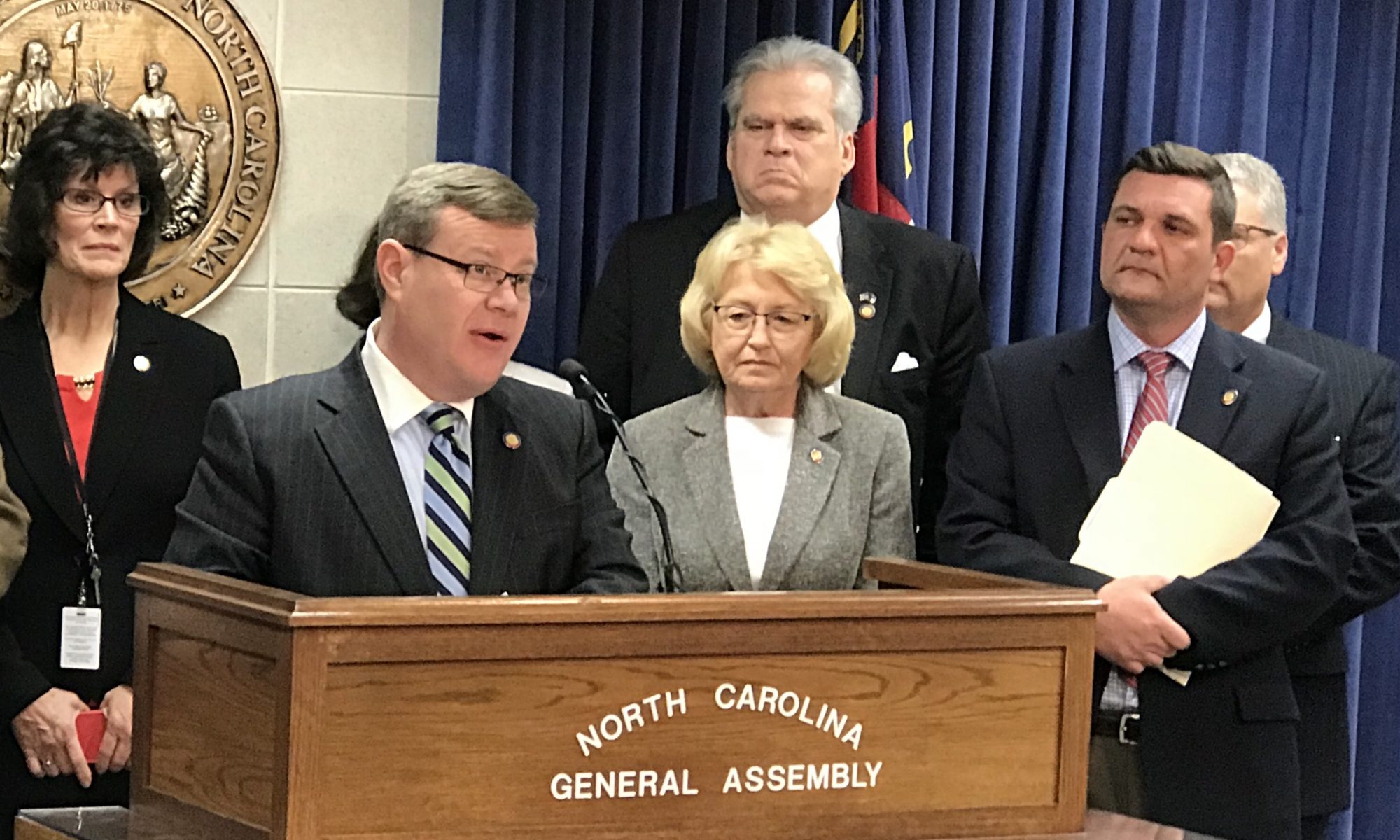Raleigh, N.C. – Education leaders in the North Carolina House of Representatives joined Speaker Tim Moore (R-Cleveland) at a press conference Thursday to introduce a $1.9 billion school construction bond proposal to give more students 21st century classrooms across North Carolina.
House Bill 241 Education Bond Act of 2019 is primary sponsored by Speaker Moore, Senior Appropriations Committee Co-Chair Linda Johnson (R-Cabarrus), House Education Committee Co-Chair Jeffrey Elmore (R-Wilkes), and House Education Committee Co-Chair Craig Horn (R-Union).
Speaker Moore said there was a statewide consensus that a skilled workforce needs new and renovated classrooms, and that education is what matters most to families and businesses in North Carolina.
“School construction funding is a cornerstone of the state House’s 2019-2020 education agenda,” Moore said. “To train our workforce for the needs of tomorrow, we must meet the needs of their classrooms today.”
A full transcript of Speaker Moore’s remarks is included below.
H.B. 241 would provide $1.5 billion in capital funding to K-12 schools, $200 million to community colleges, and $200 million to the UNC system.
The legislation provides flexibility for counties and local school boards to determine how to spend funding on their greatest needs – whether construction or repairs and renovations.
The UNC Board of Governors and North Carolina Community Colleges would also determine how to allocate the funds to best-serve their systems and student needs.
Senior House Appropriations Co-Chairwoman Linda Johnson (R-Cabarrus) said the formula for providing funds to different counties in the legislation weighted school systems with the greatest need.
“We have prioritized low-wealth counties in the metrics to determine funding, along with average attendance and growth,” Johnson said.
Rep. Jeffrey Elmore (R-Wilkes), a public school teacher for nearly two decades and co-chair of House committees on education, agreed the legislation is modeled to assist school systems with the greatest needs.
“Our bond proposal is very positive for rural schools,” Elmore said.
“Many of our systems really don’t have the capability to issue bonds. This approach is a partnership between county commissions, school boards, and the state of North Carolina, to help education communities secure a piece of funding for vital capital improvement plans.”
Rep. Craig Horn (R-Union), an education committee co-chairman in the state House of Representatives, said many students are learning in facilities over 50 years old built “in a different time for a different purpose.”
“Today, go into a classroom and it’s nothing like most of us saw in our classrooms,” Horn said Thursday. “If we are going to continue to progress, to continue to have an opportunity for our kids, our NC kids, to be the best in education, we need to provide them the best in facilities.
Speaker Moore visited three local school systems to gather input and support for the bond proposal this year, including a trip to Columbus County where House Deputy Majority Leader Brenden Jones (R-Columbus) hosted a forum at South Columbus High School.
“We’ve got the greatest teachers in the nation,” Jones said at the press conference. “It’s time we have the best buildings in the nation to educate our children.”
“I’d like to thank the Speaker for making the trek down to Columbus County. I serve one of the most economically distressed areas of the state. Our kids need it.”
The North Carolina School Boards Association (NCSBA) expressed support for the proposal Thursday:
“On behalf of 115 local boards of education we would like to thank Speaker Moore for his leadership on a school bond and the time he spent focusing on the needs across the state of North Carolina,” said Leanne Winner, Director of Government Relations at NCSBA.
“The bond proposal, if passed by the voters of this state, allows school districts both the guarantee of funds and knowledge of the exact amount they will receive so that school districts can plan projects accordingly.”
Vance-Granville Community College President Rachel Desmarias also attended the press conference to speak for the unique technology needs of her higher education system.
“Technology is infrastructure in today’s world,” Desmarias said. “The community college system has critical needs to update our technology so we can serve our students in the way they expect to be served.”
A full transcript of Speaker Moore’s remarks at Thursday’s press conference is below:
“Today is an exciting day for our schools and our students,” Moore said.
We all know that education is what matters most to families and businesses in North Carolina.
We have consensus that a skilled workforce needs 21st century classrooms for our state.
To train our workforce for the needs of tomorrow, we must meet the needs of their classrooms today.
School construction funding is a cornerstone of the state House’s 2019-2020 education agenda.
I want to thank the co-sponsors, House Education leaders, for their tireless commitment to our schools.
Their visionary work will advance our state’s core educational mission for years to come. That mission is to make every day in North Carolina a new opportunity for students to succeed.
To show our young people there is no limit to what they can accomplish with a great education.
To offer affordable and effective workforce training for every student, in every county.
I’ve been traveling to North Carolina schools this year in support of a capital construction bond. It’s been a unique opportunity to visit with educators who are out in the community with our kids every day.
When I talk to teachers on the front lines of learning in the classroom here in North Carolina, one thing is clear.
They support every proposal that helps their students. They don’t care about the politics of it. They don’t care about the rhetoric around it.
They care about the future of those kids they dedicate their professional careers to educating. As policymakers we must share that spirit and respond to their commitment on behalf of the next generation.
If we put student success first, we can build better education systems across North Carolina. We can create more competitive economic environments for the families who count on us.
Tomorrow’s opoortunities can connect every kid to a dream and drive their potential to change the world. North Carolina’s explosive growth this decade brings opportunities and challenges.
Let’s give those voters the choice to approve investments in local schools and higher education. We have unique needs in our large cities, their surrounding regions, and rural areas.
But responsible budgets have us well-positioned for forward looking investments. North Carolina has not passed a K-12 school construction bond in 20 years.
Our state is in a strong fiscal position with unanimous AAA credit ratings. We have hundreds of millions of dollars in revenue surpluses, and more than a billion dollars in savings.
There is currently a competitive bond market and the state can borrow now at favorable interest rates. The opportunity is now, and waiting could change these factors and increase borrowing costs.
The good news is education spending is already moving in the right direction. We added billions of dollars in annual education spending and passed five straight teacher pay raises.
We are focused on connecting the needs of all our education communities with statewide resources. Supporting our struggling counties, and rapidly growing regions, is essential for the success of all North Carolina school systems.
A statewide bond will help school districts with recent local bonds finance those investments. It will help other school districts avoid the process of a local bond through the statewide proposal.
Helping counties with capital funds now will help our constituents avoid local property tax hikes. These are the opportunities of our proposal, but I appreciate every proposal that shares this priority.
The concern I have with a pay-as-you-go plan is ending our state’s traditional education model. In North Carolina, counties are responsible for capital construction, with occasional state support.
Moving to a permanent reform of our education finance model, I believe, is the wrong approach. It is contrary to our state constitution.
We don’t need to commit state taxpayers to permanent, annual support of a local responsibility. This will create the expectation that the state will provide capital funding for counties for decades.
Our school districts need guaranteed support now –capital funds they can match with confidence. A bond uses our state’s strong fiscal standing to leverage new money now.
A pay-as-you-go plan not only makes a new permanent commitment to state support of school capital. It encumbers a substantial percentage of General Fund tax revenue, immediately reducing spending flexibility.
The people deserve input, and school systems need time to plan and be prepared to spend capital funds. Local school systems need certainty to commit matching local funds to state dollars.
The House bond proposal is an immediate injection of supporting resources for school construction. The sooner school districts can commit to major capital construction projects with the certainty of state appropriations and local matching funds, the better.
We must help them get ahead of rising construction costs and competition for materials and labor. These challenges are caused by North Carolina’s rapid growth and back-to-back major hurricanes.
Let’s make the commitment today, for the first time in two decades, to give local schools capital support. Thank you.”


